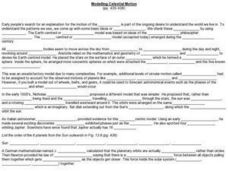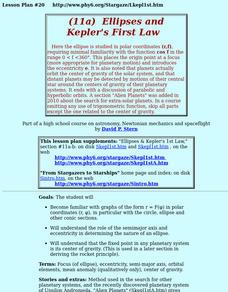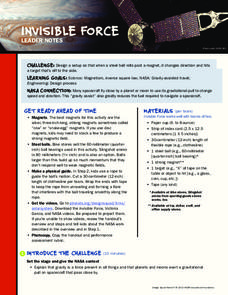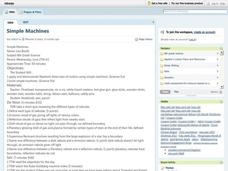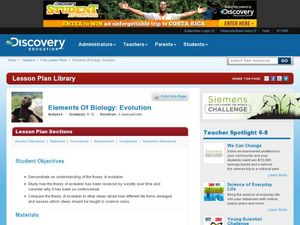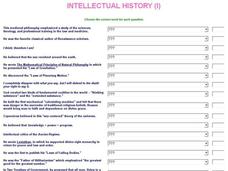Curated OER
Orbital Mechanics
Twelfth graders examine the misconceptions of Newton's laws of motion. In this motion and gravity lesson plan students interpret data and see the effects of gravity.
Curated OER
Charting Seasonal Changes
Students research the Earth's patterns of rotation and revolution, create a chart and graph of these patterns and use them to explain the causes of night and day and summer and winter.
Curated OER
Modeling Celestial Motion
In this modeling celestial motion worksheet, learners fill in the blank about the motion of celestial bodies: planets and stars. Students complete the blanks with information about the scientists and philosophers responsible for early...
Curated OER
Was Kepler Correct?
Learners investigate the elliptical orbit around the Sun. They use the information gathered to measure the distance to the Sun from the closest orbital point and the farthest orbital point.
Curated OER
Solar System
Students analyze theories on how the solar system was formed. In this solar system lesson students explain the rotation and revolution of motion.
Journey Through the Universe
Our Solar System
Take your class on a journey through our solar system. Learners explore each planet, from Mercury to Pluto, and discuss various features that differentiate one from another. They complete activities related to the topics and discuss the...
Curated OER
Ellipses And Kepler's First Law
Students explain that planets actually orbit the center of gravity of the solar system, and that distant planets may be detected by motions of their central star around the centers of gravity of their planetary systems.
Curated OER
Earth Moon Scaling
A wonderful lesson incorporating math and physics skills along with specific details about the planetary bodies. The cross-curricular approach makes for a valid activity to challenge multiple ages and abilities. Your class could work in...
Curated OER
Planets Curriculum
Students complete an in-depth study of the known planets in the solar system. As a class, students identify the planets that are known in the universe, in the night sky. They explain the differences between planets and stars and the...
Curated OER
Leading Scientist of the Scientific Revolution
Quiz your class on how well they know the leading scientist of the scientific revolution. They answer seven multiple choice questions that require them to know each major contribution of each of the following scientists: Galileo, Newton,...
PBS
Invisible Force
Investigate invisible forces. Young engineers design a setup that changes the direction of a steel ball using a magnetic force. The purpose of the setup is to model the gravitational pull of spacecraft by planetary bodies.
Curated OER
Scientific Inquiry: Periodic Motion
Students construct their own pendulum. In this physics lesson, students design an experiment to find the factors affecting its period. They formulate a conclusion based on experimental data.
Curated OER
Exploring the Celestial Neighborhood
Ninth graders study the origin and organization of the solar system. They investigate the Earth's place in the system and how planetary motions explain natural phenomena observable from Earth.
Curated OER
Simple Machines
Middle schoolers engage in a lesson that is concerned with the concept of a simple machine and uses the law of motion to justify why they operate. Students explore the laws by constructing some simple machines to illustrate the concepts.
Curated OER
The Seasons
Discover the change of the seasons by modeling the Earth-Sun system. Learners model the orbit of the Earth around the sun and explore how and why the patterns of winter and summer occur.
Curated OER
Constellations
Young scholars explore the major constellations. After reviewing the Earth's basic motions and their significance, students discuss the moon's orbit and revolutions. Using a Digitarium Alpha portable planetarium projector, they observe...
Curated OER
People of the Scientific Revolution
In this Scientific Revolution worksheet, learners read a brief overview of the contributions of Copernicus, Bacon, Kepler, Galileo, Newton, and Harvey.
Curated OER
Application of Ellipses
In this algebra instructional activity, 11th graders apply ellipses to real life scenarios such as football, satellite and planet orbits. They discuss a variety of way sto apply ellipses.
Curated OER
Introduction To Orbital Mechanics
Students use NASA drawings to build a model satellite for a specific mission. They design a set of drawings for their satellite showing its subsystems as well.
Curated OER
Elements Of Biology: Evolution
Students study the theory of evolution and examine why it is so controversial. In this biology lesson plan students view a video on evolution, research the theory of evolution on the Internet and complete an essay.
Curated OER
Intellectual History
In this online interactive world history worksheet, students answer 22 matching questions regarding the Enlightenment. Students may submit their answers to be scored.
Curated OER
Scientific Revolution
In this online interactive world history worksheet, students answer 20 matching questions regarding the Scientific Revolution. Students may submit their answers to be scored.
Curated OER
Astronomy Class
In this space science instructional activity, students find the words associated with the basic terms of Astronomy. The answers are located at the bottom of the page.
Laboratory for Atmospheric and Space Physics
The Planets and Scale
Scholars gain an insight into the relative size of planets and distance between inner and outer planets with the help of informational text, a data table, and a series of four questions.




